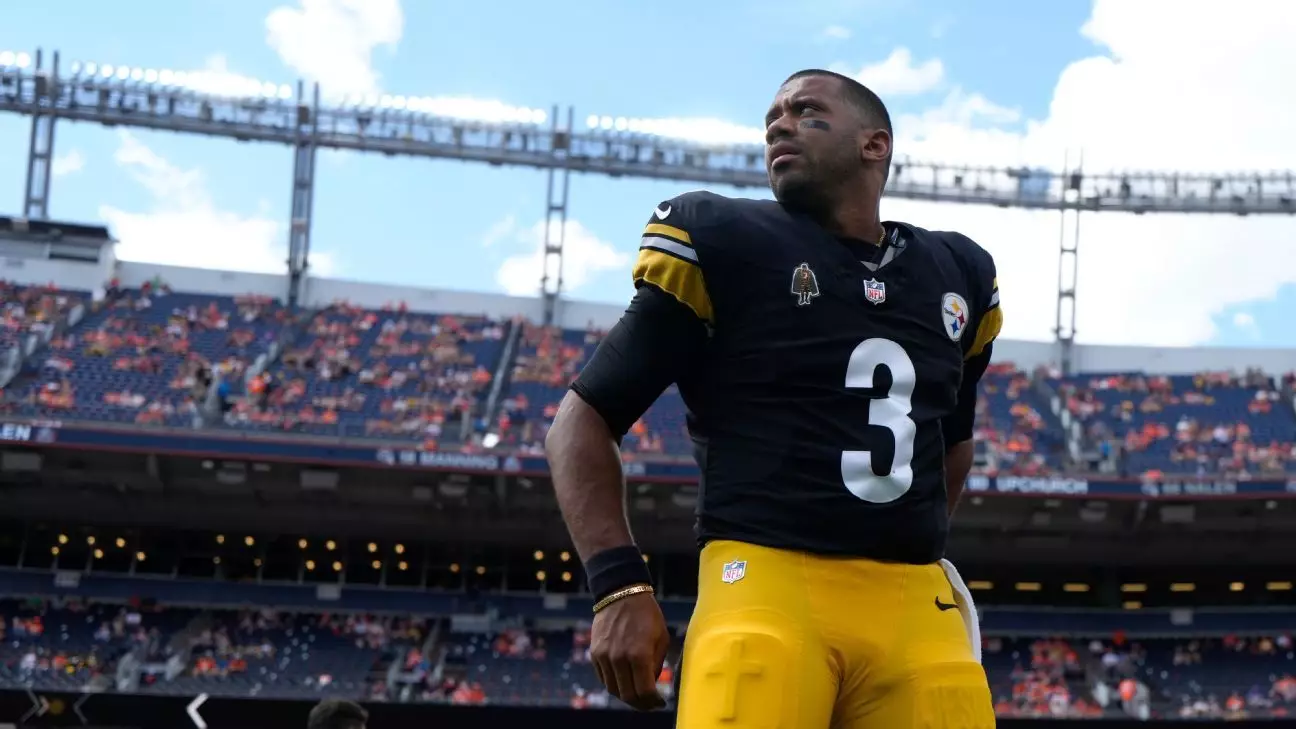In the volatile world of the NFL, emotional narratives often intertwine with performance. A recent game between the Pittsburgh Steelers and the Denver Broncos highlighted how personal histories can shape the narrative of competition, even when a player isn’t participating directly. Former Broncos quarterback Russell Wilson found himself in a peculiar situation during the Steelers’ 13-6 victory over his former team, as he did not step onto the field but still played a significant symbolic role in the game.
Head Coach Mike Tomlin’s decision to award Wilson a “petty game ball” was emblematic of the lingering feelings that players often harbor for their former teams. The term “petty” suggests a nuanced layer of rivalry, indicative of unresolved emotions stemming from Wilson’s turbulent tenure in Denver. After signing a staggering five-year, $242.6 million contract, Wilson was released just two seasons in, an outcome that speaks volumes about the high expectations and the severe disappointments that can characterize a player’s career.
Justin Fields, the Steelers quarterback, voiced the sentiment that many felt surrounding Wilson’s absence: “I think we all know Russ got kind of did dirty last year.” This language captures not only a personal connection to Wilson but also reflects a broader understanding within the players’ community about fairness and loyalty in professional sports—a topic seldom openly discussed but deeply felt.
Symbolism Over Statistics
Despite not taking a single snap, Wilson’s presence loomed large over the game. The hours of warmups he undertook before the match demonstrated his commitment, revealing a player who still cares deeply for the game and his former team. Engaging with former coaches and teammates underscored the emotional complexity of his return: it exemplified a struggle where personal attachment and professional rivalry intersect.
Wilson’s time on the field—albeit as a spectator—allowed him an avenue to connect with his past, where glances and greetings became a narrative of understanding and mutual respect. This emotional underpinning became more significant than any statistical output for the Steelers that day.
While Wilson remained inactive due to a calf injury, the game itself unfolded around him with various players spinning their own narratives. Fields’ performance, while flawed, reflected a growing legacy within the Steelers’ organization. Starting strong with a completion ratio of 10-of-12 for 101 yards, then struggling with just 16 passing yards in the second half due to penalties and a faltering run game, epitomized the unpredictable, often chaotic nature of football.
Fields’ commentary on the challenges of winning in the league, especially in hostile environments, serves to remind fans and players alike that football is as much about mental resilience as it is about physical prowess. Wilson, through his symbolic role, illustrated a different kind of resilience—one shaped by experiences outside the lines of competition.
Wilson’s dual journey as a competitor and community member illustrates the often-overlooked emotional depth within the sport. Professionalism in football extends beyond the gridiron; it resides in memories, relationships, and shared experiences that persist long after the final whistle blows. This intersection of loyalty, rivalry, and camaraderie builds a compelling narrative arc that defines players’ careers and influences future generations.
The concept of a “petty game ball” transcends its immediate significance; it symbolizes how players acknowledge and confront their pasts, emphasizing that emotional well-being can often affect performance in profound ways. The day may belong to the Steelers, but in the storytelling realm of the NFL, Russell Wilson continues to remind us of the complexities that lie within every competitive match—highlighting that behind the players’ faces are stories of ambition, heart, and human connection.
In an age where stats often overshadow stories, this encounter challenges us to remember that sports are not just about wins and losses; they are rich tapestries woven from the experiences of the players, their journeys, and the emotional ties that linger long after the final score is tallied.


Leave a Reply